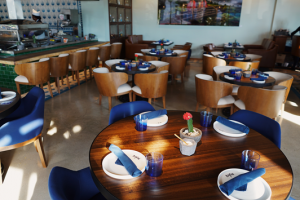In recent years, Wynwood has become the City of Miami’s most tourist-friendly neighborhood. It received more than four million visitors in 2019 and supported over 5,000 local jobs, according to a neighborhood report.
Then came the pandemic. For months, NW Second Avenue has been a ghost town. Workers, tourists, and locals have all stayed home.
Now the area is welcoming increasing numbers of clients. Rules that require masks, sanitization and spacing are being enforced almost everywhere. Several businesses are taking big steps to get things back to normal, but there is still a long way to go.
One of those businesses is the Wynwood Shop, located at 181 NW 25th St. The store sells photography, paintings, digital art and accessories from local Miami artists.
Owner Diana Gonzalez explains the shop closed on March 18 and had to adapt during the pandemic. She downsized from 3,000 to 1,000 square feet.
“We had to reduce a lot of our costs,” she said. “Before, we used to have two employees in the store, now we had to cut that to one per day. We were struggling, and we were revising everything we were doing to cut costs and be able to survive.”
Marcela López, sales manager of Wynwood Shop and an artist whose work is sold at the store, said that she had to find other sources of income while the store was adapting during the pandemic.
“What I started to do was to find other sales avenues, since I was at home and I had the time,” she said. “I started taking photos, uploading and selling them online. It wasn’t the same amount of income that I was receiving from the store, but I discovered another way.”
After the store reopened on May 23, Gonzalez had to request all customers wear masks as they entered the store. Employees did the same and also constantly cleaned all surfaces.
“We were marking the floor as well, so there is a line in the cash-out area with a 6-feet distance between each mark,” Gonzalez said.
“We had to learn how to manage the store, the sales and the clients in a different way,” said López. “Since we opened up, it has been going really well. Everyone in the community welcomed us back. People started talking about the store very quickly.”
Most customers are local, though some have been from Tampa and Jacksonville, Gonzalez said. Before the pandemic, the majority of customers were international and domestic tourists.
Before the shop had to close, roughly 100 clients would walk in daily, and more on the weekends, Gonzalez said. Since they reopened, around 20 to 30 clients have walked in per day.
“I think it’s going to take a while to get to the point where we were before, especially because of international traveling,” said Gonzalez. “But I’m seeing a lot of locals coming to the store, which before was only 10 percent, but now they are the majority of people who are coming to Wynwood.”
Gonzalez thinks that the neighborhood is gradually going to attract more people since it’s a big open area, rather than a mall or other enclosed businesses.
Another business that was affected in the area is the restaurant Bakan, located just up the street at 2801 NW 2nd Avenue.

Bakan is a Mexican restaurant that has over 500 types of mezcals and tequilas as well as hand-crafted tortillas and sundry Mexican dishes.
The restaurant’s general manager, Juan Fitmaurize, said it had to close for two months for dine-in customers and work with a limited staff. They had take-out available with a limited menu and third-party delivery.
Bakan reopened on May 27 and has had to adapt to the new rules, such as taking the temperatures of employees every day, opening at a 50 percent capacity and offering QR-code menus where clients could take a picture and see the menu on their phone, among many other adaptations.
“Reopening made us incur additional costs that we didn’t have before, such as having a company come to the restaurant and do a daily deep cleaning and sanitization process; making signs for social distancing, and buying the equipment for our employees to be safe,” said Fitmaurize.
On a recent weekend, Bakan was full both inside and outside, although many restaurants in the area remained closed or only served takeout. Almost no customers wore masks. Servers all wore them.
Before the pandemic, the restaurant accommodated 500 to 600 clients on weekdays. After the reopening, they accommodated only 80 to 90 clients per day, according to Fitzmaurice.
The City of Miami is helping by making on-street parking spaces available for restaurants to expand their outdoor area, creating easier food pick-up locations and providing one hour of free parking per day.
“Adding outdoor capacity allows restaurants to serve more people while abiding by the new requirements,” said Taylor Cavazos, a representative of the Wynwood Business Improvement District. “It will also encourage diners to come back, as many may now prefer to sit outdoors.”

































